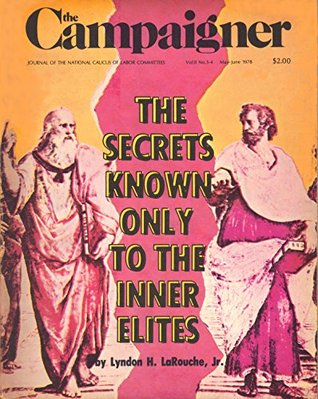Kindle Notes & Highlights
The cult of Apollo should not be viewed as merely a curious institution of that period. It was on the one side the key monetarist financial institution of that period. On the other side it deployed two cults as covers for its intelligence operations as such. One of these cults was the cult of Apollo itself. The other principal cult was a subcult known as the Phrygian cult of Dionysus (in its Roman form, the cult of Bacchus). British intelligence services (as a whole) at the present date represent essentially a continuation of that cult and its characteristic methods and techniques.
...more
The technology of culture has not changed profoundly since the fourth century BC. The essential methods and techniques of the cult of Apollo, and its continuation at Oxford and Cambridge have not altered in a single essential feature. The objectives. the policies. the methods remain essentially the same.
Such antiscientific literary undertakings aside, the principal empirical pursuit of the Peripatetics in matters of knowledge was the subject of botany. This is the one aspect of Aristotle’s writings which stands out as having some explicit content of interest in the development of knowledge. Why the exception in this case? The interest in botany was essentially political, in a manner of speaking. The specialty of the Peripatetic assassins was poisoning.
Dionysian cults, yesterday and today: throughout the centuries a basic item of antihumanist social control technique.
The methods of creating synthetic religious cults as instruments of state domestic and foreign policies is known in some significant detail since Babylon. The original synthesis of what later becomes the Jewish religion represents only one form of such Babylonian synthetic religious cults. It is not the details of these cults, that ought to occupy our attention here, but rather the characteristic features of such cult-design from then to the present time. The usual form of the religious cult down to the Christian era was associated with a pantheon of polymorphs, gods and semi-deities
...more
The thrust, on the humanist, or city-builders’ side, throughout the known sources, is toward the deified human hero or heroine, for which the Herakles-Prometheus model is typical: the giver of knowledge (reason) to a whole people.
The antihumanist policy emphasizes the opposite policy: it proposes the irrationality of the deities, it insists upon the unfathomable mystery of the order of the universe. On this basis, we can not confidently assume that the existence of image-worship in itself meant one thing or the other.
launched by British intelligence services during the 1920s, with the evil Bertrand Russell the central figure in this operation. During the 1920s, Russell, as a principal spokesman for the effort, laid out a spectrum of projects, all aimed to bring about a “new dark age,” through which an oligarchy-ruled “feudalist” utopia could be established on a world scale.
The ruling elites of civilization have very long memories, and represent objectives and policies which have not changed essentially over thousands of years.
History has been recorded chiefly for the time and circumstances in which source-documents were written. What is said is usually intended to be credible by prevailing standards of that period.
The fact of the matter is that the British colonial system has always followed the instruction of Adam Smith’s Wealth of Nations, the policy that populations should be kept wherever possible in a backward state of economic and cultural development relative to Britain itself. This was the feature of Adam Smith against which the American Revolution was fought. It is also a fact that the British colonial office pursued a political doctrine of “cultural relativism” with respect to colonial peoples in general, and promoted that doctrine as anthropological propaganda, as a part of the effort of
...more
The effort to reconcile two interconnected causes, energy and reason, into something equivalent to a single “equation” points us immediately in the direction of the most fundamental issues of scientific knowledge. Energy is ordinarily measured in calories, watts, and so forth. These are all scalar measures. In what units is human reason to be measured? The concern of Thales and other Ionians for the combined action of mind, fire (energy), and continuous primary substance cannot seem so unimportant a conception as Aristotle and his admirers have purported to make the issue--it is indeed so
...more
The key to scientific method, and thus to the mastery of both science and history, is the method of the Platonic dialogue. This is also properly termed the dialectical method, as such a method is associated with Thales, Heraclitus and Plato. It is not, however, the “dialectical method” represented in most of the available literary productions of the Moscow Institute of Marxism-Leninism--even though the kernel of Karl Marx’s method was a distillate from the Ionian dialectical method. This Platonic method has two inseparable facets. As a consequence of its findings, the Platonic method
...more
Marx’s failure was broadly his effort to elaborate his work within British historical mythologies, and to close himself off from the “inner secrets” of the elite by his foolish “materialist” emphasis respecting the determination of ideas. Both these principal errors were necessarily interdependent.
History is to be understood as the subjective connection between “objective” events and conditions perceived, as they are “subjectively” perceived, and the “objective” consequences of the human actions (or acts of omission) taken in consequence of such perception. The crucial subject matter is not merely that “subjective” element itself, but the processes which determine the character and development of that “subjective” element.


